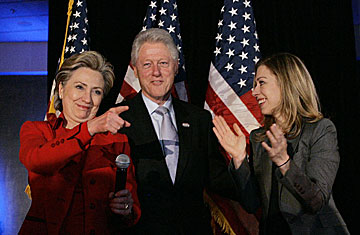
Hillary, Bill and Chelsea Clinton, cheer Ms. Clinton's supporters after she was declared the winner of the Nevada Democratic caucus in Las Vegas.
In the slightly absurd experiment known as the 2008 Nevada caucuses, Hillary Rodham Clinton had a lot of the tactical disadvantages. Her main opponent for the Democratic presidential nomination, Barack Obama, could boast the coveted endorsement of the 60,000-member Culinary Workers union. Caucus organizers set up special precincts on the Las Vegas Strip designed to make it easier for those union members who worked Saturday to cast their votes. And John Edwards, though trailing in the race for the nomination, threatened to siphon support away from Clinton because of his populist appeal to working class Democrats. Those disadvantages were substantial enough that Clinton's campaign advisers were predicting they would lose Nevada on Saturday — and were busily explaining to reporters, and themselves, why it wouldn't matter in the long run.
As it turned out, all those factors paled next to Clinton's perceived strengths on the issue that has suddenly rocketed to the top of voters' concerns nationally — the economy. Clinton won 51% of the overall vote to Obama's 45% and Edwards' embarrassingly low 4%. (Mitt Romney won the GOP caucuses easily, capitalizing on Nevada's sizeable Mormon population and the fact that none of his Republican opponents made more than a token effort in the Silver State.) Roughly 100,000 voters participated in caucuses that were moved forward in the primary calendar specifically to give a western state a say in determining who would win the two parties' nominations.
Among those that did caucus, fully half named the economy as their top concern. This abrupt change in the winds may well be good news for Clinton; her association with the days when her husband oversaw strong economic growth (and her husband was a heavy presence in Nevada), as well as her willingness to speak in more detailed policy terms than Obama, give her an advantage over her opponents among those concerned about the economy.
Clinton's apparently huge advantage among Nevada's Hispanic voters also bodes well for her, as the campaign moves toward the states that hold primaries on Mega Tuesday (the stakes are so high that it's outgrown Super), Feb. 5. Many of the biggest prizes — including California, Arizona, Colorado, New Mexico, New York and New Jersey — have sizeable Hispanic voting blocs.
But there are two contests left before then. The first, South Carolina, is a must win for Obama. African Americans make up roughly 50% of Democratic primary voters in the Palmetto State, and they have been massing to Obama's side in the days since his historic victory in the Jan. 3 Iowa caucuses. (In Nevada, entrance polling indicates Obama won 80% of the fairly small black vote.) In the largely symbolic Michigan primary earlier in the week, 75% of African Americans cast their votes for "uncommitted" because Obama was not on the ballot. "You have to assume we lose South Carolina," says a Clinton strategist. Like Michigan, the Jan. 29 Florida primary technically doesn't count because the Democratic National Committee stripped the state of all its delegates when it leapfrogged ahead of Feb. 5 without permission from the Democratic National Committee. But all the Democratic contenders will be on the ballot in Florida, and the Clinton campaign is counting on both winning the state and picking up some momentum from the "victory" over Obama.
Despite her surprise triumph in Nevada, the Clinton campaign remains convinced that the nomination battle with Obama will drag on for weeks as each side fights to accumulate delegates. If there's still no clear Democratic winner by Feb. 6and it looks increasingly likely, given that none of the Feb. 5 contests award a winner all of a state's delegatesthe nomination battle could drag on through March, when Ohio and Texas hold their primaries, or even until April 22, when Pennsylvania holds its primary. And if the race is still undecided come May, the Clinton campaign will likely start petitioning the DNC to reconsider its decision to strip Michigan and Florida of its delegates. The result: a messy Democratic nomination battle that might weaken the party's eventual nominee by the time summer rolls around.
But that's two weeks away. And in this election cycle unlike any before it, two weeks is an eternity.
